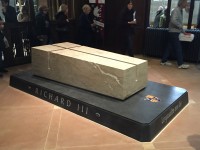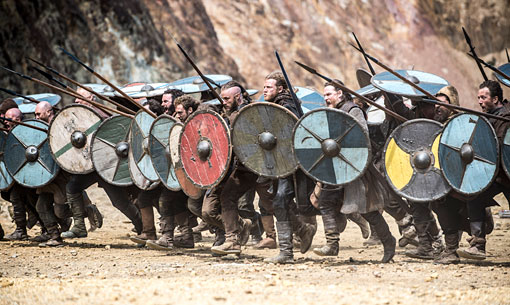The Discovery of Richard III’s Grave and the Fallibility of Memory

Richard III’s tomb at Leicester Cathedral. Photo by Isananni
One year ago, Richard III, one of England’s most notorious kings, was reburied at Leicester Cathedral after a series of celebrations and ceremonies suitable for a national hero. Actor Benedict Cumberbatch even read a poem written by Poet Laureate Carol Ann Duffy. Fortunately for him, the poem did not include the word “penguin” (also here). To commemorate the anniversary, the University of Leicester has released a 3D model of Richard’s skeleton in its original, too-short, poorly-dug grave.

Richard III, child-killer and national treasure
Amid all the hoopla, it’s easy to forget that Richard III was not the People’s Princess, but rather a man who almost certainly ordered the murder of two children, both of whom were his nephews and one of whom was probably the rightful king of England. I’ve been interested in the way Richard’s image has been rather successfully rehabilitated through the publicity surrounding the discovery of his remains and their reburial. For the moment, though, I’m going to focus on one element of the story: the way the search for and discovery of the body has itself become mythologized, possibly with the help of a faulty memory.
TAGS: Leicester, memory, Philippa Langley, Richard III, Richard III SocietyVikings Exhibition at Discovery Times Square: Setting History Straight-ish

Entrance to Vikings Exhibit, Field Museum.
Last year, I had the opportunity to visit a Vikings exhibition at the Field Museum of Natural History in Chicago. I had been invited to Chicago to give a Skeptics in the Pub talk about the erroneous and distinctly odd belief that Leif Erickson discovered Bigfoot in Vinland. I gave the talk on Saturday and went to the exhibit on Sunday. It was a whole Viking-themed weekend—the best kind of weekend. Bigfoot was noticeably absent from the exhibit (and, indeed, the Field Museum in general).
In the last year, I have moved from Wisconsin to New Jersey, and the Viking exhibit has moved from Chicago to New York. I’m tempted to visit it again. I enjoyed it the first time, although it made me a little sad because it reminded me that I was not able to visit the British Museum’s 2014 exhibit, Vikings: Life and Legends. The two exhibits take very different approaches to the Vikings. The British Museum emphasized warfare, stating in one of its press releases:
TAGS: Discovery Times Square, Field Museum, VikingsNew interpretations place warfare and warrior identity at the centre of what it meant to be a Viking; cultural contact was often violent, and the transportation of looted goods and slaves reflects the role of Vikings as both raiders and traders.
One Toke Over The Line, Sweet Shakespeare

So stoned he doesn’t realize his quill is nowhere near the paper.
There is brand new evidence that Shakespeare was a pothead! This exciting story has appeared on the websites of TIME, the Los Angeles Times, CNBC, the Today Show, CNN, and many more outlets. And the brand new evidence is only fourteen years old! And it’s really weak evidence.
Francis Thackeray, Phillip Tobias Chair in Paleoanthropology at the Evolutionary Studies Institute, University of the Witwatersrand, Johannesburg, South Africa, recently published a short piece called “Shakespeare, plants, and chemical analysis of early 17th century clay ‘tobacco’ pipes from Europe” in the South African Journal of Science. But this isn’t the first time Thackeray has written about the topic. Oh, far from it. His one-page piece in the “Scientific Correspondence” section includes twelve end notes, nine of which cite nine different writings authored or co-authored by Thackeray.
TAGS: cannabis, Francis Thackeray, hemp, marijuana, Shakespeare, sonnetsBotanist Makes “Literary Discovery of the Century”

Shakespeare, is that you? Detail from the title page of John Gerard’s Herball
During the past couple of days, media outlets have been running stories claiming that the only authentic portrait of William Shakespeare made during his lifetime has been discovered by botanist and horticulturalist Mark Griffiths. Most of the articles include a quotation from Mark Hedges declaring this to be the “literary discovery of the century.” Is a portrait of a literary figure a literary discovery? I suppose that’s a semantic quibble that doesn’t really matter. Often great literary discoveries are made by scholars who study the relevant literary field, and great discoveries concerning art history are made by art historians. At first glance, a botanist writing about a portrait of Shakespeare would seem to be arguing outside his field of expertise, and Shakespeare tends to attract some peculiar interpretations. But that doesn’t really matter as long as Griffiths provides strong evidence in a peer-reviewed journal like Shakespeare Quarterly, or Shakespeare Survey, or one of several other scholarly journals dedicated to Shakespeare in particular or English literature in general.
Or Country Life, a weekly glossy magazine devoted, according to Wikipedia, to “the pleasures and joys of rural life.” It has featured articles on “Britain’s Best View, The Cream of Counties survey, England’s Favourite Village, Britain’s oldest inhabited dwelling (2003), and Dream Acres imaginary landscape (2009)” (Wikipedia). And, or course, “the literary discovery of the century” (2015). Hmmm. My friend Sharon Hill of Doubtful News often warns her readers about “Science by Press Conference.” That warning can be broadened to include all Scholarship by Media Blitz.
TAGS: Country Life, Herball, John Gerard, Mark Griffiths, Shakespeare, Shakespeare portraitFalse Balance and the Shakespeare Authorship “Debate”
 About a month ago, my phone suggested that I might want to read a Newsweek article called “The Campaign to Prove Shakespeare Didn’t Exist” by Robert Gore-Langton. I was somewhat disturbed that my phone knew I had an interest in the manufactured controversy over Shakespeare’s authorship of the works attributed to him. I was also a little irritated that my phone, which has apparently progressed from snooping through my email to acquiring some form of telepathy, didn’t know that I was getting tired of the subject.
About a month ago, my phone suggested that I might want to read a Newsweek article called “The Campaign to Prove Shakespeare Didn’t Exist” by Robert Gore-Langton. I was somewhat disturbed that my phone knew I had an interest in the manufactured controversy over Shakespeare’s authorship of the works attributed to him. I was also a little irritated that my phone, which has apparently progressed from snooping through my email to acquiring some form of telepathy, didn’t know that I was getting tired of the subject.
I’ve written about Shakespeare denialism many times before (most comprehensively here), and I’ve started to feel like I’m running around in circles while simultaneously banging my head against a wall (do not try this). The Newsweek headline, though, seemed to offer a new twist: Shakespeare didn’t exist at all?! Wow, that’s taking Shakespeare denialism as far as humanly possible. It’s as if someone not only claimed that the moon landing was a hoax but also said that there is no moon to land on. (Wait, what? Someone actually claimed that?)
Well, it turns out that Newsweek and my phone had tricked me with that headline. No one is saying that William Shakespeare, whose baptism and burial are recorded, didn’t exist. Instead someone is saying yet again that he was not the primary author of the plays and poems attributed to him.
TAGS: Alexander Waugh, false balance, Shakespeare, Shakespeare authorshipKirk Cameron and His Critics: Is Halloween Christian or Pagan?

Actor Kirk Cameron. Image by Gage Skidmore, via Wikimedia Commons. Used under Creative Commons Attribution-Share Alike 3.0 Unported license.
Kirk Cameron, former child actor and current fundamentalist Christian and Young Earth Creationist, is promoting a new film, Kirk Cameron’s Saving Christmas. Based on the trailer, it seems that Kirk’s brother-in-law, Christian, played by the film’s director and co-writer Darren Doane, isn’t enjoying the Christmas season: it’s too commercial and has pagan roots. It’s just not Christian enough for Christian. Luckily Kirk is there to show Christian that every element of Christmas is directly related to Jesus and Christianity. The proselytizing and forced merriment make me want to slap a reindeer.
But Christmas isn’t the only holiday Cameron wants to save. He also has big plans for Halloween. In an interview with the Christian Post, Cameron explains that Christians shouldn’t hesitate to celebrate Halloween because it is, like Christmas, an entirely Christian holiday:
TAGS: All Saints' Day, All Souls' Day, Halloween, Kirk Cameron, SamhainThe real origins have a lot to do with All Saints Day and All Hallows Eve. If you go back to old church calendars, especially Catholic calendars, they recognize the holiday All Saints Day, with All Hallows Eve the day before, when they would remember the dead. That’s all tied in to Halloween.
History Channel’s Vikings and the Mystical Land of England

On the History Channel series Vikings, Ragnar’s army charges into battle. Photo by Bernard Walsh/HISTORY. Copyright 2014
Have you ever watched a movie or a television show with someone who nitpicks tiny little things? You know, the guy who bitterly complains that a car parked halfway down the street wasn’t in production until 1956 even though the show is set in 1955? We all know that guy. We all hate that guy. And occasionally, we all are that guy. Today I’m going to be that guy.
 I’ve finally watched the first season of History’s Vikings, written by Michael Hirst. From time to time, friends who know that I studied Old Norse and that I enjoy all things Viking have asked me if I’d seen it, but I was wary because I knew it would annoy me. This is the History Channel after all, the people who gave us Ancient Aliens. Despite my wariness, I did try to watch it a few months ago. It annoyed me. The shifting accents—sometimes thick, sometimes barely existent—annoyed me. The stupidest hairstyles in the history of hair annoyed me. And, above all, the constant smirking of protagonist Ragnar Smirky-Breeches annoyed me. Okay, it’s actually Ragnar Lothbrok (Loðbrók) or “Hairy-Breeches,” but his breeches aren’t hairy, and he does smirk. A lot.
I’ve finally watched the first season of History’s Vikings, written by Michael Hirst. From time to time, friends who know that I studied Old Norse and that I enjoy all things Viking have asked me if I’d seen it, but I was wary because I knew it would annoy me. This is the History Channel after all, the people who gave us Ancient Aliens. Despite my wariness, I did try to watch it a few months ago. It annoyed me. The shifting accents—sometimes thick, sometimes barely existent—annoyed me. The stupidest hairstyles in the history of hair annoyed me. And, above all, the constant smirking of protagonist Ragnar Smirky-Breeches annoyed me. Okay, it’s actually Ragnar Lothbrok (Loðbrók) or “Hairy-Breeches,” but his breeches aren’t hairy, and he does smirk. A lot.
So I gave up for a bit, but recently I tried again, and I have really tried to appreciate it. I do appreciate that Hirst seems to have used some recognizable medieval sources, such as Saxo Grammaticus’s Gesta Danorum (for many of the characters); Ibn Fadlan’s account of the Rus (for the Vikings’ disgusting washing ritual in episode 2 and for Earl Haraldson’s ship funeral. Both scenes will be familiar to anyone who’s seen The 13th Warrior); and Adam of Bremen’s third-hand account of the pagan temple at Uppsala. I also enjoy hearing occasional snippets of Old Norse and Old English.
TAGS: History Channel, Michael Hirst, pseudohistory, Vikings









